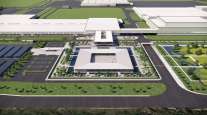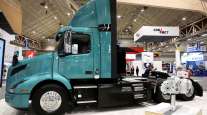The Atlanta Journal-Constitution
Hyundai, Georgia Tech to Research Hydrogen Power for Trucks

[Stay on top of transportation news: Get TTNews in your inbox.]
Hyundai Motor Group signed an agreement with Georgia Tech on Sept. 19 to collaborate on research and development of hydrogen-fueled engines for large trucks and electric vehicle batteries, both critical steps in the South Korean automaker’s plans to be a leader in alternative fuels.
The agreement, called a memorandum of understanding, formalizes Hyundai and Georgia Tech’s partnership on EV and hydrogen research and establishes workforce training and curricula for Hyundai’s EV and battery factory near the Georgia coast and a battery plant in Bartow County.
The company’s $7.6 billion EV and battery factory under construction near Savannah, which it calls the Metaplant, could help pave the way for the state’s first network of hydrogen-powered tractor-trailers and commercial vehicles. The technology, while novel in the U.S., is used at other Hyundai factories and could put Georgia Tech — and the Peach State — on the cutting edge of transforming large truck travel and logistics.
“We believe the future of mobility is going to be led by hydrogen,” José Munoz, Hyundai’s North American chief executive, told a crowd of Georgia Tech students and faculty Sept. 19. “We would like Georgia Tech to be our exclusive partner to develop the fuel cell EVs for the future.”
Hyundai’s focus on hydrogen helped spur efforts by state leaders to explore how a network of fueling stations could be implemented between the Port of Savannah and the Metaplant site. In early August, the Georgia Department of Transportation issued a request for information to seek corporate input, which Munoz said will work in lockstep with the research Hyundai and Georgia Tech will conduct. He added that the partnership will explore everything from hydrogen sourcing to fuel cell improvements.

University System of Georgia Chancellor Sonny Perdue (standing, left) looks on as Georgia Tech Executive Vice President for Research Chaouki Abdallah (seated, left) and President Ángel Cabrera (second from left) sign the memorandum of understanding with Hyundai officials. (Georgia Tech)
Hyundai manufactures hydrogen fuel cell big rigs, known as Xcient, and uses them to transport materials in its operations in South Korea. Hydrogen has been hyped for years as an energy source that could help trucking and other hard-to-decarbonize parts of the global economy wean off fossil fuels. While it is the most abundant element in the universe, hydrogen rarely exists on its own on Earth.
To be used as a fuel, it needs to be isolated from other compounds that contain it. While trucks powered by hydrogen produce far fewer tailpipe emissions, reducing greenhouse gases that contribute to climate change, the environmental benefits depend on how the hydrogen is produced.

Georgia Tech President Ángel Cabrera (left) poses for a selfie with Euisun Chung, executive chairman of Hyundai Motor Company. (Georgia Tech)
Tim Lieuwen, executive director of Georgia Tech’s Strategic Energy Institute, said last month that the interest in hydrogen helps “fill out the portfolio” of the state’s clean energy profile.
“The idea of having it available to fleets or at a port, I think that’s very feasible and something that can happen very quickly,” Lieuwen said.
Munoz said the partnership with Georgia Tech will also help connect the South Korean conglomerate with young engineers and potential workers — and Hyundai is going to need thousands in the coming years.
The Metaplant alone will employ 8,500 workers, and Hyundai’s joint partnership with SK On in Bartow County is expected to hire 3,500 employees. Munoz said EV battery and manufacturing plants require workers with high-tech skill sets.
“When you see how our plant is going to operate, it’s like a lab,” he said.

Perdue speaks at the signing ceremony. (Hyundai)
Sonny Perdue, the chancellor of the University System of Georgia, said Hyundai and other companies are clamoring for talent, especially since the state’s unemployment rate remains at near-record lows.
As the Metaplant deal was being finalized, he said Hyundai executives were initially focused on financial incentives — of which they received a $1.8 billion deal from state and local governments — but Perdue said that focus has since switched to “talent flow.”
Labor disputes also have emerged as a potential sticking point, with Hyundai receiving pressure from union groups in recent weeks to enact a community benefits agreement for the Metaplant and other factories in Georgia and Alabama. Munoz downplayed those concerns, pointing to a short-lived labor dispute in South Korea that ended Sept. 19 with a signed agreement and a 12% boost in annual pay for workers.
“At the end of the day, the workers decide,” Munoz said, adding that future Metaplant workers will make 25% more than the average salary for Bryan County as part of Hyundai’s agreement with the state.
Hyundai is moving at a breakneck pace to open its Metaplant and begin manufacturing EVs domestically in the U.S., which would qualify the company for $7,500 tax credits that were enacted by the Inflation Reduction Act, President Joe Biden’s signature climate and energy legislation. Hyundai officials, including Munoz, have criticized the law’s domestic production requirements.
🌿Hyundai Motor Group and @GeorgiaTech are steering toward a greener future. With a focus on sustainability, innovation, and workforce development, we're shaping the world of mobility. 🌍🔌 Learn more: https://t.co/jyGOt218xT pic.twitter.com/3OhVHuTkPX — Hyundai USA (@Hyundai) September 19, 2023
Hyundai and its Kia and Genesis brands qualified for previous federal EV tax credits, even on models built overseas, before the IRA was implemented. The company already had committed to building its Metaplant stateside before the legislation was adopted along party lines.
“We felt that it was unfair that our company was not able to qualify since we had this contract signed,” Munoz said. “However, the law is the law, and what we decided is to double down and try to accelerate as much as possible.”
The Metaplant is slated to open in January 2025, but Munoz said Hyundai believes it could potentially be ready to open three months early based on its current construction timeline. He added that implementing a hydrogen fuel network along the Georgia coast could expand across the state, connecting the company’s other large factories.
“Once we get the (hydrogen) ecosystem, it should benefit not only the Savannah plant but also our plant in Alabama and the Kia plant in Georgia,” he said.
Want more news? Listen to today's daily briefing below or go here for more info:
Distributed by Tribune Content Agency, LLC




